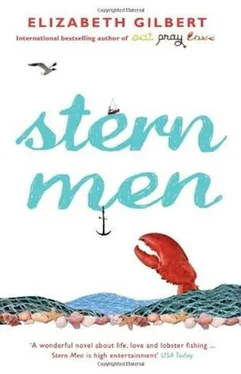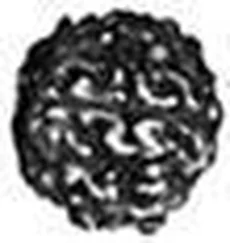The lobster boats were still in the channel, working and circling. From her perch on the cliffs, Ruth saw the boat of Mr. Angus Addams and the boat of Mr. Duke Cobb and the boat of her father. Beyond them, she could see a fourth boat, which may have belonged to someone on Courne Haven Island; she couldn’t identify it. The channel was so littered with lobster trap buoys, it looked like a scatter of confetti on a floor or dense litter on a highway. Men set their traps nearly on top of one another in that channel. It was risky, fishing there. The border between Courne Haven Island and Fort Niles Island had never been established, but nowhere was it more in contention than in Worthy Channel. Men from both islands defined and defended their ground hard, always pushing toward each other. They cut away each other’s traps and waged collective assaults toward the opposite island.
“They’ll drop their traps on our front goddamn doorsteps, if we let them in,” said Angus Addams.
On Courne Haven Island they said the same of Fort Niles fishermen, of course, and both statements were true.
On this day, Ruth Thomas thought the Courne Haven boat was hovering a little close to Fort Niles, but it wasn’t easy to be sure, even from above. She tried counting strings of buoys. She picked a blade of grass and made a whistle with it, pressed between her thumbs. She played a game with herself, pretending that she was seeing this view for the first time in her life. She shut her eyes for a long moment, then opened them slowly. The sea! The sky! It was beautiful. She did live in a beautiful place. She tried to look down on the lobster boats as if she did not know how much they cost and who owned them and how they smelled. How would this scene look to a visitor? How would Worthy Channel look to a person from, say, Nebraska? The boats would look like toys, adorable and sturdy as bathtub boats, manned by hardworking Down East characters who dressed in picturesque overalls and gave each other friendly waves across their bows.
Ya can’t get thah from heah…
Ruth wondered whether she would enjoy lobster fishing more if she had her own boat, if she were the captain. Maybe it was just working with her father that was so unpleasant. She couldn’t imagine, though, whom she would enlist as a sternman. She ran over the names of all the young men from Fort Niles and quickly confirmed that, yes, they were all idiots. Every last drunken one of them. Incompetent, lazy, surly, inarticulate, funny-looking. She had no patience for any of them, with the possible exception of Webster Pommeroy, whom she pitied and worried over like a mother. But Webster was a damaged young man, and he was certainly no sternman. Not that Ruth was any lobsterman. She couldn’t kid herself about that. She didn’t know much about navigation, nothing about maintaining a boat. She’d shrieked “Fire!” to her father once when she saw smoke coming out of the hold; smoke that was actually steam from a ruptured hose.
“Ruth,” he’d said, “you’re cute, but you’re not very smart.”
But she was smart. Ruth had always had a sense of being smarter than anyone around her. Where had she got that idea? Who had ever told her such a thing? God knew, Ruth would never publicly admit this sense of hers. It would sound appalling, horrible, to admit what she believed about her own smartness.
“You think you’re smarter than everyone else.” Ruth had often heard this accusation from her neighbors on Fort Niles. A few of the Pommeroy boys had said it to her, as had Angus Addams and Mrs. Pommeroy’s sisters and that old bitch on Langly Road whose lawn Ruth had mowed one summer for two dollars a pop.
“Oh, please,” was Ruth’s standard reply.
She couldn’t deny it with more conviction than this, though, because she did, in fact, think she was considerably smarter than everyone else. It was a feeling, centered not in her head, but in her chest. She felt it in her very lungs.
She was certainly smart enough to figure out how to get her own boat if she wanted one. If that was what she wanted, she could get it. Sure. She was certainly no dumber than any of the men from Fort Niles or Courne Haven who made a good living by lobstering. Why not? Angus Addams knew a woman on Monhegan Island who fished alone and made a good living. The woman’s brother had died and left his boat to her. She had three kids, no husband. The woman’s name was Flaggie. Flaggie Cornwall. She made a good go of it. Her buoys, Angus reported, were painted bright pink, with yellow heart-shaped dots. But Flaggie Cornwall was tough, too. She cut away other men’s traps if she thought they were messing with her business. Angus Addams quite admired her. He talked about her often.
Ruth could do that. She could fish alone. She wouldn’t paint her buoys pink with yellow hearts, though. Jesus Christ, Flaggie, have some self-respect! Ruth would paint her buoys a nice, classic teal. Ruth wondered what kind of name Flaggie was. It must be a nickname. Florence? Agatha? Ruth had never had a nickname. She decided that if she became a lobsterman-a lobsterwoman? lobster person? -she’d figure out a way to make a great living at it without getting up so goddamn early in the morning. Honestly, was there any reason a smart fisherman had to wake up at four A.M.? There had to be a better way.
“Are you enjoying our view?”
Cal Cooley was standing right behind Ruth. She was startled but didn’t show it. She turned slowly and gave him a steady look.
“Maybe.”
Cal Cooley did not sit down; he stood there, directly behind Ruth Thomas. His knees almost touched her shoulders.
“I sent your friends home,” he said.
“Did Mr. Ellis see the Senator?” Ruth asked, already knowing the answer.
“Mr. Ellis isn’t himself today. He could not see the Senator.”
“That makes him not himself? He never sees the Senator.”
“That may be true.”
“You people have no idea how to act. You have no idea how rude you are.”
“I don’t know what Mr. Ellis thinks about these people, Ruth, but I sent them home. I thought it was too early in the morning to be dealing with the mentally handicapped.”
“It’s four o’clock in the afternoon, you prick.” Ruth liked the way that sounded. Very calm.
Cal Cooley stood behind Ruth for some time. He stood behind her like a butler, but more intimate. Polite, but too near. His nearness created a constant feeling that she did not appreciate. And she did not like speaking to him without seeing him.
“Why don’t you sit down?” she said, at last.
“You want me to sit next to you, do you?” he asked.
“That’s entirely up to you, Cal.”
“Thank you,” he said, and he did sit down. “Very hospitable of you. Thank you for the invitation.”
“It’s your property. I can’t be hospitable on your property.”
“It’s not my property, young lady. It’s Mr. Ellis’s property.”
“Really? I always forget that, Cal. I forget it’s not your property. Do you ever forget that, too?”
Cal did not answer. He asked, “What’s the little boy’s name? The little boy with the tusk.”
“He’s Webster Pommeroy.”
Which Cal Cooley knew.
Cal stared out at the water and recited dully: “Pommeroy the cabin boy was a nasty little nipper. Shoved a glass up in his ass and circumcised the skipper.”
“Cute,” Ruth said.
“He seems like a nice child.”
“He’s twenty-three years old, Cal.”
“And I believe he is in love with you. Is this true?”
“My God, Cal. That is truly relevant.”
“Listen to you, Ruth! You are so educated these days. It is such a pleasure to hear you using such big words. It is rewarding, Ruth. It makes us all so pleased to see that your expensive education is paying off.”
Читать дальше









